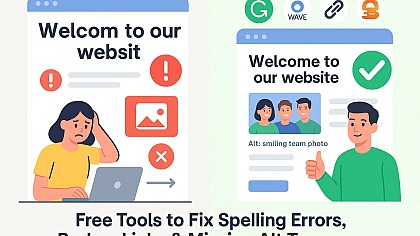
SEO Myths Debunked: What Really Matters for Ranking Now
Search Engine Optimization (SEO) is a constantly evolving field. As algorithms become more sophisticated, SEO myths continue circulating, confusing marketers and business owners.
To thrive in 2025, it’s crucial to separate fact from fiction and focus on strategies that impact your website's ranking. Below, we’ll debunk common SEO myths and clarify what matters for achieving success in search rankings.
Myth #1: Keyword Stuffing Still Works
The idea that "more is better" regarding keywords is outdated. In the early days of SEO, cramming a webpage with a specific keyword could trick search engines into ranking it higher. Today, keyword stuffing not only fails but can lead to penalties.
What really matters is keyword relevance and intent. Focus on natural language, aligning content with what your audience is searching for. Tools like Google's Keyword Planner and SEMrush can help identify terms that resonate with user intent.
Myth #2: Backlinks Are All About Quantity
Many believe that having thousands of backlinks guarantees top rankings. While backlinks remain critical, quality far outweighs quantity. Search engines prioritize links from reputable, high-authority websites.
To build valuable backlinks, concentrate on creating shareable and authoritative content—such as case studies, infographics, or well-researched blogs. Outreach to credible websites and provide them with a reason to link back to you.
Myth #3: Social Media Directly Impacts SEO Rankings
The misconception that social media activity directly improves SEO rankings is persistent. While social signals—likes, shares, and comments—don't directly influence ranking, they have an indirect effect.
Social platforms are excellent for amplifying your content, driving traffic to your site, and increasing the likelihood of gaining backlinks. Engaging content shared on social media platforms can lead to more visibility, ultimately benefiting your SEO.
Myth #4: You Must Publish New Content Constantly
Some marketers believe that frequent publishing is a must to maintain or boost rankings. While regular updates are important, quality always trumps quantity.
Search engines favour content that provides value and satisfies user intent. Instead of churning out mediocre articles, focus on creating in-depth, evergreen content. Periodically refreshing older content with new information and updated visuals—like premium stock photos—can also improve performance without requiring constant new posts.
Myth #5: SEO Is a One-Time Task
A common misconception is that SEO is something you "do once and forget." In reality, SEO is an ongoing process. Algorithms change, competitors emerge, and search trends evolve.
To maintain rankings, it’s essential to:
- Conduct regular audits of your website.
- Monitor performance metrics using tools like Google Analytics.
- Stay updated on algorithm changes and adapt your strategies accordingly.
Myth #6: Exact Match Domains Are Necessary
Years ago, owning a domain that exactly matched your target keyword (e.g., "buy-cheap-laptops.com") was seen as a surefire way to rank. Today, this strategy holds little weight.
What truly matters is brand authority and relevance. Choose a domain name that represents your brand effectively and ensures an excellent user experience.
Myth #7: Only the #1 Spot on Google Matters
While ranking first on Google is a coveted position, it’s not the only measure of success. The rise of featured snippets, People Also Ask sections, and local search results means that being visible in multiple places can be just as effective.
Focus on ranking for diverse queries and optimizing for rich results. Include structured data markup to increase your chances of appearing in featured snippets or rich cards.
Myth #8: Meta Descriptions Directly Affect Rankings
Meta descriptions do not directly influence search rankings. However, they play a vital role in click-through rates (CTR). A well-written meta description entices users to click on your link, which can signal relevance to search engines.
Craft compelling meta descriptions that include a clear value proposition and align with user intent.
Myth #9: SEO Is Only About Google
While Google dominates the search engine market, ignoring other platforms like Bing, Yahoo, and DuckDuckGo can be a missed opportunity.
Moreover, consider the growing importance of vertical search engines like Amazon for product searches and YouTube for video content. Optimizing your presence on these platforms can expand your reach.
What Matters in SEO for 2025?
- User Experience (UX)
Search engines prioritize websites that offer a seamless user experience. Factors like mobile-friendliness, fast loading times, and intuitive navigation significantly impact rankings. - E-A-T (Expertise, Authoritativeness, Trustworthiness)
Content that demonstrates expertise, authority, and trustworthiness continues to be favoured by search engines. Showcase your credentials, cite reputable sources, and provide accurate information to build trust. - Core Web Vitals
Google's Core Web Vitals—measuring loading speed, interactivity, and visual stability—remain critical. Invest in technical SEO to improve these metrics. - Visual Content Optimization
Images and videos are increasingly vital for engaging users. Ensure images are properly compressed, include descriptive alt text, and align with the content theme. Using high-quality visuals, such as stock photos, can enhance the appeal of your content while maintaining professionalism. - Voice Search Optimization
With the rise of smart speakers and voice assistants, optimizing for voice search is essential. Focus on natural, conversational keywords and provide concise answers to commonly asked questions. - Local SEO
Small businesses should prioritize local SEO by optimizing Google My Business profiles, collecting reviews, and targeting location-specific keywords.
Navigating SEO in 2025 means shedding outdated practices and embracing strategies rooted in value, user experience, and technical excellence. By debunking these common myths and focusing on what matters—like quality content, authoritative backlinks, and user satisfaction—you can position your business for sustainable growth.
Whether you're optimizing blog posts, product descriptions, or visual content using high-quality stock photos, the key is to stay adaptable and prioritize your audience’s needs. Remember, SEO is not about gaming the system; it's about creating a website that people love and trust.














